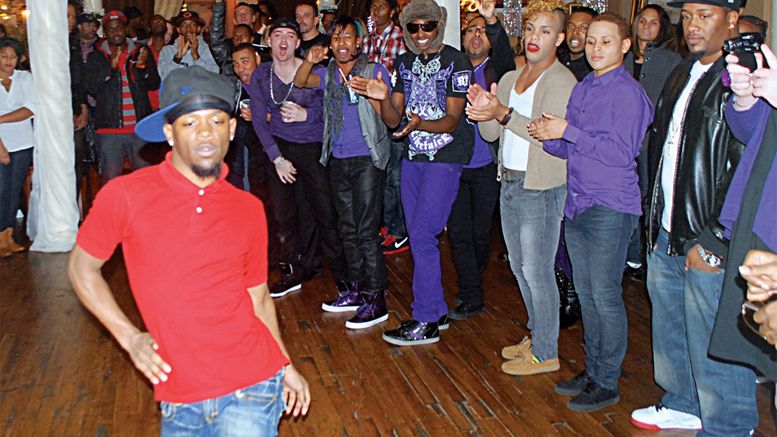Voguing as entertainment with a twist: Saving Young Lives; Originally Run on August 4, 2016
By: John Paul Stapleton/TRT Reporter—
Boston’s Finest New England Mother, Athena Khan, sits on the stage in her canary yellow dress calling out the names of award winners. While she’s calling, the winners are soaked in cheers that coalesce with the beat of the DJ’s pounding mix. Some winners humbly grab their award, but others make a spectacle.
People take to the floor to vogue as if they were going to lose the award they just won. Sometimes challengers would come out. These performances have the crowd going wild. At a certain point, one inaudible name is called and the winner comes to the center platform of the stairwell entrance from the balcony. Rather than walking down the beautiful spiral staircase, he jumps over the banister and lands majestically to keep his performance going.
This kind of spectacle people only get to see when they watch “Paris is Burning,” but this isn’t a movie, and it’s not in New York. This is the second annual awards ball held by BAGLY, the Boston Alliance of Gay Lesbian Bisexual Transgender Youth, a group that works to support LGBTQIA youth, at the Villa Victoria Center for the Arts. It turns out that Boston is actually the center of a huge New England ball scene. Many of the international houses have chapters here and they’re thriving.
“It started off as a family aspect,” Khan said. “There was a time that a lot of GLBTQ people were becoming homeless because they were coming out of the closet and there was the whole HIV and AIDS epidemic.”
Youth would get picked up by or join the collectives of LGBTQIA people called “houses.” At first they were local, but now there are houses all over the world. In some cases, each individual house may have hundreds—or even thousands—of members. House mothers are often stand-in parents for many of the youth. From providing food and shelter to promoting self-confidence to helping youth perfect their craft for the ball scene itself, these houses have become a transformative force for many young people.
“Now ballroom, that started with pageants,” Khan went on to say. “The families from each of these houses would come together and compete. It was like queen for a night. You had the opportunity to be who you want to be. At the time GLBTQ people weren’t allowed to express themselves.”
The manner of dress at these balls is always extravagant. Whether presenting as male, female, or any other identity, that presentation is to be emphasized as much as possible. The attire can be a part of the competition at these pageants as well as voguing. This dancing got mainstream attention when Madonna incorporated it into her 1990 video for “Vogue.” For this dance, the performer uses their body to make geometric or symmetrical poses, fluidly moving between them to a beat. The ball scene is the main place to test this craft and gives youth a skill to work on with their other house members.
As with any job, a youth must be qualified and give something in return. Legendary New England Mother, De’Zyre Revlon, says that many houses expect something from you. Some houses want you to participate in a ball or win a certain number of pageants. Above all, the house has to want you and want the best for you.
“I was a young knucklehead who was making a lot of mistakes and someone was willing to give me the opportunity,” Revlon said. “They said, ‘I don’t like what you’re doing. I want you to come and meet these people.’ So I was adopted into a family that way and the ballroom aspects were introduced at a later time.”
Evidently, it can go beyond the competition, but also if the house is no longer doing something for a youth, then that youth can leave and find another.
“It wasn’t always handouts,” Revlon said. “They made sure you work for what you had. They made sure they helped you as long as you’re working for something. It was ‘you should get a job,’ ‘you should do this,’ ‘you should finish school and if you’re not going to finish school, get a job.’”
Beyond being employed, the houses are in place to make sure you aren’t getting into trouble whether it be legal or the kind of trouble that came with the HIV and AIDS epidemic. Today, many adults in the scene are a part of LGBTQ community organizations and provide guidance to the whole ball scene rather than their own house. Khan herself is involved with Connected Boston, a health navigator for GBTQ men of color and BAGLY, Revlon with TransCEND, a group that helps disadvantaged transgender women.
“Families are created to keep you in the limelight but to also make sure you’re taking care of yourself,” Khan said. “A big thing that’s going on is [HIV/AIDS] testing and prevention and that’s what I can say for New England. Our main focus is on prevention within [the] ballroom to make sure people are taking care of themselves.”
Many balls will offer reduced ticket prices if an entrant gets tested, but Revlon threw a ball that provided free admission to anyone who got tested. Testing can prevent the spread, but general sex education can help the individual; there are health care navigators available to provide advice on safe sex practices and risk levels.
“There’s always condoms around whenever BAGLY throws a ball,” Courtney Ebony, 22, a youth from the scene, said. “I always have condoms on me now and I’m always able to provide my girlfriends with condoms.”
“Before I joined this scene I did not know where to go to find free condoms and lube,” Mickey 007, 22, another ball scene youth, said. Mickey will be referred to as his ball scene moniker for the purposes of this article.
“When I had joined the scene I was not having sex like that, so I had not gotten tested either, but I did feel like it [was] available to me once I did want to get tested.”
Not only have they been educated, they’ve also gotten involved with those same community organizations. Ebony has been involved with BAGLY for six years and Mickey 007 has been working with Connected Boston and won an award for his community work this past year.
“For nearly a decade, BAGLY has been honored to collaborate with, and help support, Boston’s vibrant and resilient Ball and House communities. BAGLY’s mission and commitment to leadership development, health promotion, and racial and economic justice are well aligned with the work of Boston’s Ball and House communities, and so we are proud to celebrate our partnership and shared success,” said Grace Sterling Stowell, executive director for BAGLY.
These are the kinds of things that are possible with every ball scene. Every house can bring you up and help you to get to a new place, but in New England, everyone is helping everyone.
“When I go out there, I get love and stuff, but I choose my gay family not from my house, but who I connect with,” Ebony said. “I have a gay mother who helped me become the woman I am today.”
The family aspect is important. Revlon and Khan were originally in the same house but are no longer. They’re still sisters, though. Revlon stressed that the house you’re in is more of a brand that you represent, “365 days a year, seven days a week, 24 hours a day,” but your chosen family is pivotal to maintaining your identity.
“The most important thing to know about the New England Ball Scene,” Revlon said, “is that outside of the ball, we’re all a family.”







